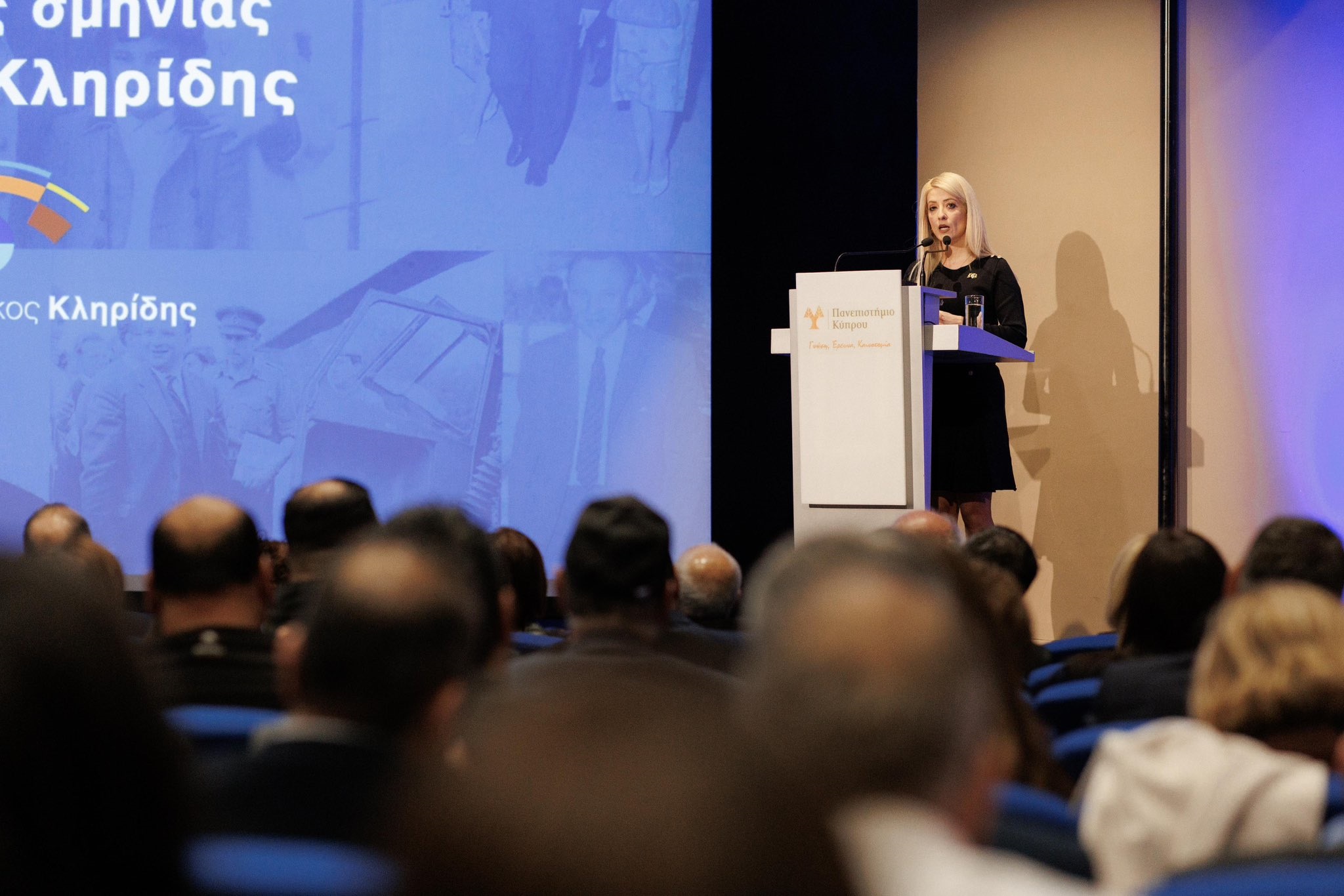House President Annita Demetriou said on Friday the Greek Cypriot side is “only asking for what the resolutions contain” in its efforts to resolve the Cyprus problem.
The resolutions to which she was referring are the various United Nations Security Council resolutions regarding the Cyprus problem, which stipulate that the island be united into a bizonal, bicommunal federal state with political equality between the Turkish Cypriot and Greek Cypriot communities.
To this end, she called for negotiations to resolve the Cyprus problem to be restarted, “with the aim of a just and sustainable solution”.
Such a solution, she said, “constitutes the necessary basis for security, peace, and stability”, which are “necessary conditions for development and prosperity”.
“No matter how many reforms you make, no matter how many innovations you implement, when you do not have security, peace, or the rule of law, how will you be able to achieve the requisite results?” she asked.
She also expressed optimism regarding the mooted enlarged meeting on the Cyprus problem involving Greece and Turkey, saying it may lead to “further progress” and “a next step”.
Additionally, she called for further participation of civil society, and women in particular, in the process of resolving the Cyprus problem.
“This is a matter of democracy, representation, and inclusion,” she said, adding that initiatives involving women’s groups “can unlock new opportunities”.
With this in mind, she said that “where dead ends seem to exist, there may also be greater opportunities”.
She was speaking at magazine the Economist’s annual Cyprus summit and was one of three Cypriot political party leaders to do so, with Akel’s Stefanos Stefanou and Diko’s Nicholas Papadopoulos also addressing attendees.
Stefanou also stressed the need for negotiations to resolve the Cyprus problem to restart, “despite the difficulties arising from the current long-standing stagnation and the increased pessimism seen in both communities”.
“Cyprus can create momentum to move towards reunification negotiations,” he said, while admitting that the lack of talks since their collapse at Crans Montana in 2017 has “intensified the climate of acceptance of the de facto situation”.
He said this climate now “prevails in both communities” – a fact which “further complicates the situation”.
On this matter, he pointed out that the Turkish Cypriot leadership “has moved away from the agreed basis of a bizonal, bicommunal federation, now promoting a two-state solution”, and that UN envoy Maria Angela Holguin “identified the lack of common ground for an agreed solution”.
Against this backdrop, he said, “the Greek Cypriot side must remain consistent on the basis of a bizonal, bicommunal federation and emphasise that any other approach will lead to the finalisation of the islands partition.”
He said that therefore, talks must resume from where they left off in Crans Montana, based on the framework set out at the time by UN Secretary-General Antonio Guterres and the convergences reached up to the point at which talks collapsed.
He also called on Cypriot society to “put pressure on political leadership to have them move in the right direction”, and said his party has “intensified its efforts to address the climate of pessimism which leads to stagnation, and instead pressured leadership to move in the right direction.”
Nicholas Papadopoulos was slightly more hard-nosed on the matter, saying, “the question before us is whether reunification talks can regain momentum. The short answer is yes. The slightly longer answer is that it depends.”
He said Holguin’s appointment, the informal dinner attended by Guterres, President Nikos Christodoulides, and Turkish Cypriot leader Ersin Tatar, and plans for an enlarged meeting are all “positive developments”, and also spoke positively of the deepening of ties between Cyprus and the United States.
He did, however, note the current lack of common ground between the two communities, saying, “the solution lies within the UN framework for a bizonal, bicommunal federation, but the Turkish Cypriot side’s position remains fixed on a two-state solution.”
To this end, he stressed the “crucial role” of Turkey in the coming enlarged meeting, but also criticised what he described as “authoritarianism” and “expansionism” on the part of the Turkish government.
“In the last four years alone, Turkey has conducted military operations in Syria, Iraq, Libya, and Nagorno-Karabakh,” he said, going on to accuse the country of “supporting terrorist organisations in the Middle East”.
“The presence of 40,000 Turkish soldiers in Cyprus is an indication of the country’s aggressiveness,” he added.
He said that Cyprus is “contributing to the region’s stability” and made reference to its cooperation with both Egypt and Israel on energy projects, and the ‘Estia’ plan, which has seen the island used as a hub to evacuate European Union and third country nationals from conflict zones.
He then criticised Turkey for its role in the Ukraine war, saying the country had “facilitated Russia”, before saying of the Cyprus problem that “there is no Cyprus problem, there is a Turkey problem.”







Click here to change your cookie preferences